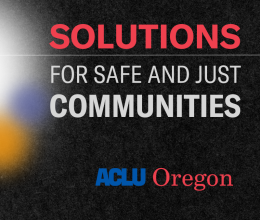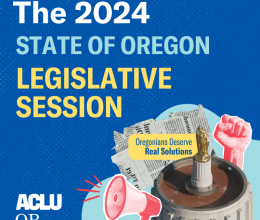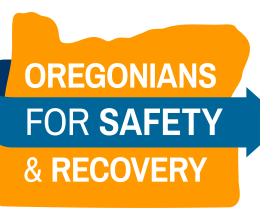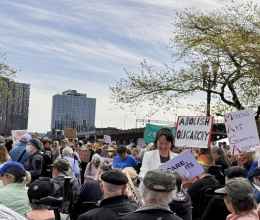
“HB 4002 puts people in jail, not in treatment.”
SALEM, Ore. — Today, Oregon lawmakers are holding what is likely to be the only public hearing on House Bill (HB) 4002, which would employ war on drugs tactics to recriminalize addiction. Advocates including addictions specialists, public defenders, community organizations, people representing Black and brown Oregonians attended the hearing at the state capitol and hundreds of people submitted written testimony to oppose treating addiction as a crime.
“Lawmakers must take action to address addiction and homelessness with real solutions. But HB 4002 is political theater, not good policy, that will make these issues worse. It will divert limited tax dollars away from real solutions such as treatment, housing, and non-police mobile crisis teams like CAHOOTS and Portland Street Response,” says Sandy Chung, Executive Director at ACLU of Oregon. “HB 4002 is designed to waste untold millions of taxpayer dollars on an unconscionable expansion of Oregon’s dysfunctional criminal system, which already wastes billions of state tax dollars annually, and it appears that lawmakers are trying to avoid a clear and thorough vetting of this bill and its full social and economic costs by the public. HB 4002 is a massive failure of leadership by Democratic and Republican legislators who are leaning into fear-mongering, jails, and prisons instead of leading with the courage, care, and real solutions that Oregonians deserve and need.”
Not only failing to solve Oregon’s addiction crisis, HB 4002 will also inflict permanent and disproportionate government harm and violence on Black and brown people in our community who have long struggled with discriminatory policing and lack of treatment services.
“HB 4002 will inflict more government harm and violence on Black and brown communities. Black and brown Oregonians will be arrested at higher rates and be most likely to face incarceration and harsher sentencing. This will only widen the racial disparities in our state,” says Gloria Ochoa-Sandoval, Policy and Political Director at Unite Oregon Action. “We call on the lawmakers to reject this racist approach and develop a bill that invests in, rather than harms, our communities.”
Oregonians for Safety and Recovery urges lawmakers to focus on real solutions in order to address the addiction crisis. Since Measure 110 services were funded, new services have increased nearly 300%. Even still, the current level of services doesn’t come close to meeting the needs of Oregon communities: approximately 50% of people seeking services are unable to access them.
As it stands, HB 4002 imposes jail, fines, or both on people struggling with addiction. This approach has never succeeded in connecting people to treatment or reducing drug addiction and overdose deaths — no matter the location or the level of penalty imposed. Oregon is no exception. Portland State University Research shows that before Measure 110, law enforcement failed to connect people to care. In spring 2020, when drug possession was a Class C misdemeanor crime, overdose deaths in Oregon skyrocketed to 70% over the previous year, driven by the arrival of fentanyl to our state. When drug possession was a felony, meth-related deaths increased by 53% over two years in 2003 and heroin overdose deaths skyrocketed in 2010. Meanwhile, two years of research have shown that despite the increased overdose rates in Oregon and other states from the arrival of fentanyl, Measure 110 helped reduce deaths by increasing overdose prevention services. Alarmingly, when Washington recriminalized possession, overdose rates increased.
“History and research show that the criminal system has always failed to help people struggling with addiction. HB 4002 puts people in jail, not in treatment. Instead of handcuffs, people need more detox, more supported and recovery housing, more rapid response on our streets with outreach workers trained to get people into care,” says Tera Hurst, Executive Director of Health Justice Recovery Alliance. “If the legislature would focus on proven strategies that work, providers, law enforcement, and stakeholders could come together in partnership and more people would get the help they need.”
¹Heroin deaths surge in Oregon, April 5, 2010, Oregonian, Maxine Bernstein
###
About Oregonians for Safety and Recovery:
Oregonians for Safety and Recovery (OSR) coalition members include ACLU, ACLU of Oregon, Drug Policy Alliance, Ebony Collective Coalition, Health Justice Recovery Alliance, Imagine Black, Partnership for Safety & Justice, and Unite Oregon. These organizations work collaboratively to defend Measure 110 and decriminalization while advocating for real solutions, including increased investment and accessibility to drug treatment, detox, and housing services to meet the full needs of people experiencing addiction.






